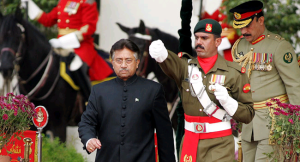Ex-President Dies In Dubai Hospital

Pervez Musharraf, Pakistan’s exiled former military ruler, died in a Dubai hospital on Sunday at the age of 79, the army said.
Musharraf seized power in a bloodless coup in 1999 and was serving as Pakistan’s army chief, chief executive, and president at the time of the 9/11 attacks on the United States.
During Washington’s invasion of neighboring Afghanistan, the general became its most important regional ally, surviving several assassination attempts by militants.
“Pakistan’s decision under Musharraf to join the war against terror turned out to be a boon,” analyst Hasan Askari told AFP, citing the influx of aid linked to his decision to back the US.
“He will be remembered as one who presided over Pakistan at a very critical time.”
Senior military chiefs “express heartfelt condolences on sad demise of General Pervez Musharraf”, a brief statement released by the military’s media wing said.
“May Allah bless the departed soul and give strength to bereaved family.”
According to media reports and a senior security official who spoke to AFP, the four-star general died in a hospital in Dubai on Sunday morning.
“I can confirm that the late general breathed his last in Dubai this morning … He is no more,” the official, who asked not to be named, told AFP.
In nearly nine years of ruling the country, Musharraf oversaw a stint of economic growth spurred in large part by a huge injection of aid from Washington for supporting the war on terror. But the conflict quickly spilled into the border areas of Pakistan.
His easygoing persona also failed to mask the blurring of the division between the state and army, and Musharraf fell out of favour after trying to sack the chief justice and failing to control an unravelling economy.
Musharraf twice suspended Pakistan’s constitution — famously saying it “is just a piece of paper to be thrown in the dustbin” — and implemented emergency rule when a bid to sack the country’s chief justice sparked months of protests.
He was also accused by rights groups of rampant abuses, rounding up thousands of political opponents and dissidents.
After the December 2007 assassination of opposition leader Benazir Bhutto, the national mood soured even more and crushing losses suffered by his allies in the 2008 elections left him isolated.
==============
For More News Join Our WhatsApp Group Below: https://chat.whatsapp.com/CdPVxGOPHCI5Kd4ALZduZ7